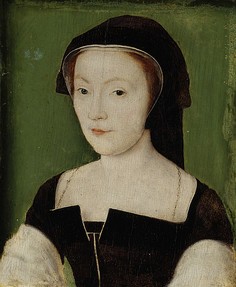 So often in Scottish history, the problems arise because of a too young monarch. In this case, it was Queen Mary who was only an infant.
So often in Scottish history, the problems arise because of a too young monarch. In this case, it was Queen Mary who was only an infant.
Scotland was Catholic; and so was its Regent, Mary of Guise (pictured), mother of Mary, Queen of Scots. She was also French, and a member of the powerful de Guise family in Lorraine. As a result, most of her ministers were men shipped over from the homeland, rather than the traditional Scottish nobility.
This did not go down well.
Moreover, her daughter, the Queen of Scotland, was now married to the French Dauphin. She would also become Queen of France. This did not bode well for the future.
There were Protestants in Scotland before all of this, and they were growing in number sufficiently to cause some alarm in the early 16th century. Lutherans had been burned at the stake as heretics; and their prayer books were banned.
Mary, Queen of Scots, had become betrothed to the future King of France because of Henry VIII of England's 'rough wooing'. He had wanted Mary married to his own son, Edward. When that was rejected on religious grounds (Henry VIII had broken with the Catholic church), the response from England was to attack.
Whole regions of south-east Scotland were devastated by the English armies (swelled as they were with German and Spanish mercenaries). The Battle of Ancrum Moor brought an end to it, with a Scottish victory, but it felt temporary to Mary of Guise. She sent for help from France and it arrived. But in return, she had to agree to her daughter marrying the future Francis II of France.
Scotland's tiny queen was packed off to be raised in France. The Scottish nobility despaired of ever regaining their traditional positions, in the government of their own country. Anti-French feeling ran high.
The Scottish Reformation did not happen overnight. It took until the reign, in England, of Queen Elizabeth I for boiling point to be reached. In order to break the dominance of France over Scotland, some nobles looked to England for assistance.
For a while there, in 1559-1560, both English and French troops had congregated in Scotland. A peace treaty was eventually agreed upon, which provided concessions for each side.
All that the English really wanted was the ability to choose Scotland's Parliament - which looked, to onlookers, precisely what the Scottish nobility wanted. It kept the French out of power there. Neither the Scottish nor French negotiators saw what was coming.
As soon as the ink was dry on the Treaty of Edinburgh, England installed a totally Protestant Parliament in Scotland. It kick-started the Scottish Reformation, which side-lined, then persecuted the Catholics in the country. It forced Mary, Queen of Scots to abdicate; and it ensured that her son, James VI of Scotland, I of England, was raised as a Protestant.
English policy had now not only secured its language and administrative ways in Scotland, but now its religion too. Moreover, this was at odds with the spiritual beliefs of the majority of Scots alive at the time!



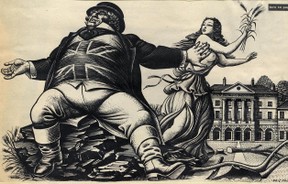 Throughout human history, nations and tribes have conquered those states and races unable to fend them off. Great empires have risen and fallen with depressing regularity.
Throughout human history, nations and tribes have conquered those states and races unable to fend them off. Great empires have risen and fallen with depressing regularity.


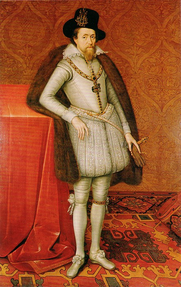 When the facts are considered out of context, then England should have been ruled from Edinburgh. The dominant force in the United Kingdom should be Scotland.
When the facts are considered out of context, then England should have been ruled from Edinburgh. The dominant force in the United Kingdom should be Scotland. 


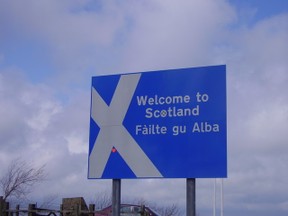 In 1290, hardly any Scot spoke English. It was confined to a few small towns right on the Scottish-English border. A century later, the Gaelic language had largely receded into the mountains, never to return.
In 1290, hardly any Scot spoke English. It was confined to a few small towns right on the Scottish-English border. A century later, the Gaelic language had largely receded into the mountains, never to return.


 So often in Scottish history, the problems arise because of a too young monarch. In this case, it was Queen Mary who was only an infant.
So often in Scottish history, the problems arise because of a too young monarch. In this case, it was Queen Mary who was only an infant.


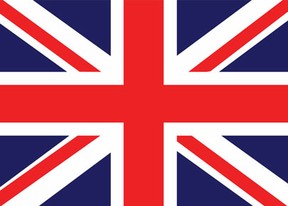 No-one can call a country conquered, until those on the streets look and sound like its conquerors.
No-one can call a country conquered, until those on the streets look and sound like its conquerors.





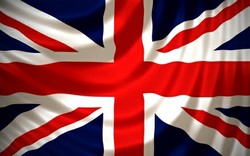

 St Tydecho's Churches in West Waleson 09/03/2014
St Tydecho's Churches in West Waleson 09/03/2014
 Goodies for an Outlander Premiere Partyon 03/06/2015
Goodies for an Outlander Premiere Partyon 03/06/2015
 Holocaust Memorial Day Interview with Rainer Höss, Grandson of Rudolf Architect of Auschwitzon 01/24/2015
Holocaust Memorial Day Interview with Rainer Höss, Grandson of Rudolf Architect of Auschwitzon 01/24/2015
 Romantic Valentine Gifts for an Outlander Fanon 01/16/2015
Romantic Valentine Gifts for an Outlander Fanon 01/16/2015

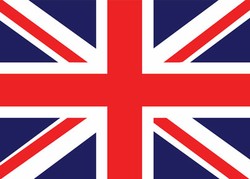
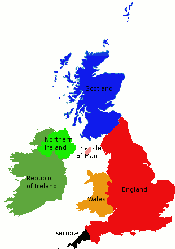
Comments
I'm glad that you thought so. I'd love to hear Scots Gaelic widely spoken again.
PS I've just realised where you're from. I've only been to your city twice, but adored it both times. I would love to come back again sometime.
That's a very insightful article - and one which would surprise (and hopefully educate) the large majority of Brits - Scots and English alike.
It's too hard not to view her with a modern outlook, but then there were other strong women at the time. Elizabeth for a start.
I know that she was in terrible circumstances, but her response was equally terrible.
I feel the same about Mary actually. she leave me feeling sad and frustrated at the same time
James VI of Scotland and I of England is the same person at least!
I'm never sure whether to feel sorry for Mary, Queen of Scots, or roll my eyes at her weakness. She never seemed to be able to grasp control of her fortunes, despite being perfectly placed to do so.
My head's spinning with all these Jameses. Poor Mary (Jr.) I think she got a rough deal. (Losing her head for one....) :-(
Wilfred Owen called that old lie from the trenches of World War One - dulce et decorum est pro patria mori. (It is sweet and right to die for one's country.) The reality is the narrative that history will always teach us. What it means to be patriotic changes from age to age, and depends upon what most benefits those making the rules.
Perhaps I'm one of those cynics whom you mention.